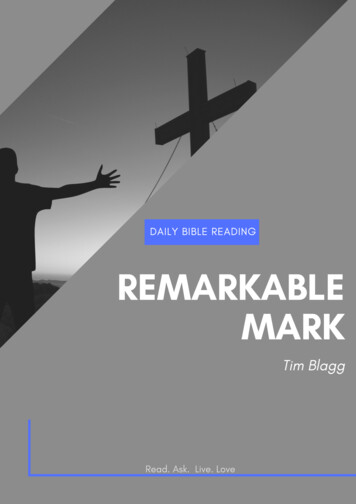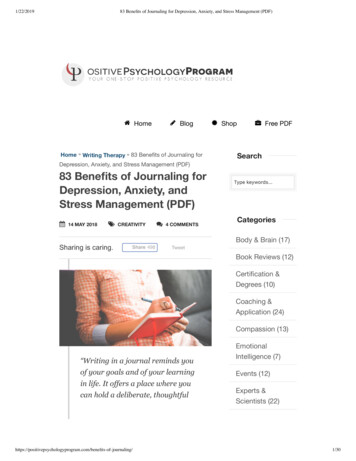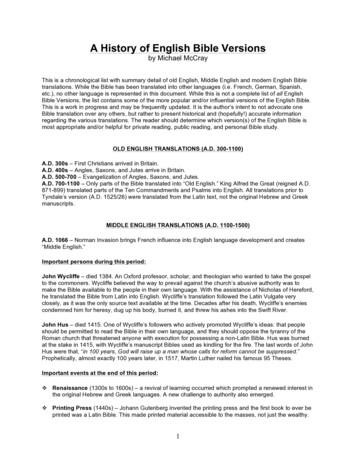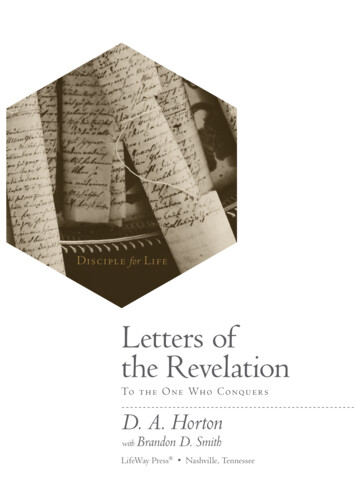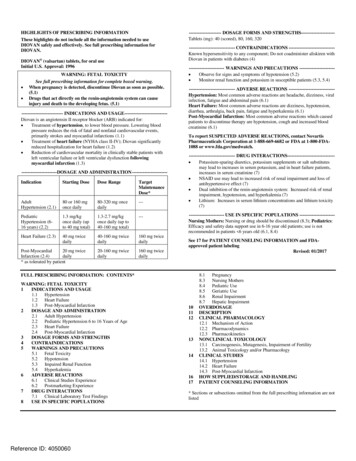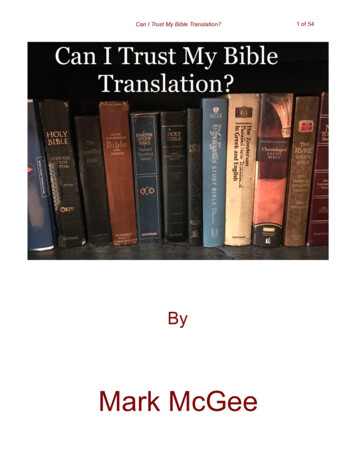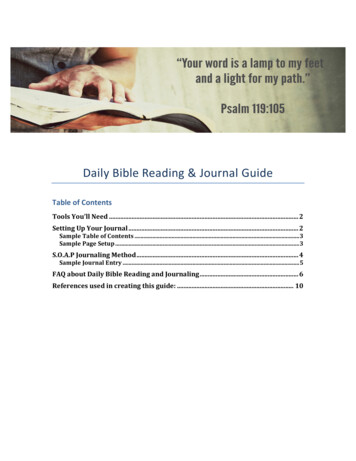
Transcription
ournaling.6Referencesusedincreatingthisguide:.10
ToolsYou’llNeed1.2.3.4.5.BibleBible Reading PlanJournalPenDaily Planner or Note padThe first four tools are obvious things you will need to do your daily Bible reading andjournaling, but you may not be familiar with the value of the fifth tool you will need.Having a daily planner or note pad with you when you are reading your daily Scripturepassages and journaling is a healthy mental tool. For some people spending quiet timewith God can be a struggle, because you know the second you try and read or pray yourmind will begin to think of all the things you have to remember to do later. I know forme I have found times where this has happened and then when I have finished mydevotions I struggle to remember all the things I have to do that came to mind whiledoing my devotions. You want to focus on your time with God, but with all the things onour to do list and the things to remember can make it hard sometimes. The best way toalleviate this situation is to have a daily planner or note pad beside you. If somethingcomes to mind that you need to do later write it down. Once you write it down you willfind that because you don’t have to mentally retain the information for later you will beable to jump back on task quicker. You want to make sure your mind is clear and open,ready to hear and receive from God. The last thing you want is to miss something fromGod because you remembered you finished the milk today and you need to add it to thegrocery list when you are done.SettingUpYourJournal1. On the first page of your journal put:a. Start Date:b. End Date:c. Your Name2. On the next page, if you would like to keep a prayer list, put “Prayer List” at thetop of two to three pages.3. After the Prayer List pages is the “Table of Contents.” An example of the table ofcontents is on the next page. A table of contents is important because whoremembers the day you wrote about something when it comes to your mind a yearlater. This way you can go to your table of contents and find what you arelooking for without having to scan each journal. Depending on the size of yourjournal you may want to leave about four pages blank for your table of contents.
SampleTableofContents4. When you are ready to use your journal you will want to include three thingsacross the top of each new journal entry. (These will help you should you everneed or want to reference something later. An example of how this might look isbelow.)a. The dateb. Give your journal entry a titlei. Sometimes it is easier to write your journal entry first then comeback and give it a title.c. Page numberi. When you are done with your journal entry be sure to record thisinformation in your table of contents.5. You are ready to get started!SamplePageSetup
S.O.A.PJournalingMethodFirst thing you need to know is that there is no right or wrong way to journal. TheS.O.A.P. journaling method is just one example of how you could go about it. TheS.O.A.P. method can be a helpful tool to help you stay on task with what you are tryingto achieve in your journaling.S.O.A.P. stands for:§ Scripture§ Observation§ Application§ PrayerStep 1Read the Scripture passages for that day, which are laid out for you in the “Daily BibleReading Plan.” If you do not have a daily Bible reading plan be sure to pick one up inthe connection area at the church or see Pastor Dustin to get one.Step 2Read with an open heart and Jesus will give you words of encouragement, direction, andcorrection (2 Timothy 3:16).Step 3You can do step 3 one of two ways. (1) You can read all of the Bible passages first thenjournal on a passage where Jesus is teaching you a life lesson. (2) You can read the Biblepassages until you come to a passage you feel Jesus teaching you about, stop reading andjournal, then when you are done journaling finish up your Bible reading for the day.Either way, once you are ready to write in your journal turn to a fresh page in yourjournal and begin to record what He has revealed to you.æ Write today’s dateæ Give your entry a title (remember it may be easier to give your entry a title afteryou are done writing).Here is where S.O.A.P. comes in:æ Scripture: write down the main scripture passage that is speaking to you.æ Observation: write what you observe from the Scripture passage.§ “Take into context the setting and the situation. Make an observation ofwhat’s happening, who’s affected, what’s taking place.”æ Application: write how you will be different today because of what you have justread.§ Application answers the question, “How does this verse or thought applyto me?”§ “Application is a crucial part of this process, for without it, all you’redoing is amassing facts, trivia, and bits of knowledge. Do you rememberwhat the Lord Jesus thought of that kind of practice? In a classicconfrontation with the Pharisees, He said: ‘I know that you are
Abraham’s descendants; yet you seek to kill me, because My word has noplace in you (John 8:37).’”æ Prayer: in light of all you have learned and written finish your journaling time bywriting out your prayer.There is a sample journal entry below to help you visualize this journaling method.Step 4Turn to the table of contents and record the date, scripture reference, title and pagenumber.SampleJournalEntry
FAQaboutDailyBibleReadingandJournalingToo Much Reading!Some people might feel, in following the Daily Bible Reading Plan, that there are just toomany chapters to cover. For those who are unaccustomed to reading, it may appear to betrue.Here are three ways to resolve that perceived problem:1. Read just half of what is presented. (It may still be twice as much as we've everread!) Begin with the New Testament reading only. Or just the Old Testament.2. Read until the Holy Spirit reveals a gem of wisdom. As you read, you willcome upon a verse that stands out. Stop there. Journal on that verse. It will containan amount of wisdom you will need for something you will be facing soon.When Is The Best Time To Do My Devotions?The answer to this is a lot easier than we make it out to be. It’s simple, the best time todo your devotions is when you are at your best. If you are a morning person do them inthe morning. If you are a night person do them at night. The important thing toremember is that Jesus deserves your best so give Him your best.What If I Miss A Day or Three?There will be times that you will miss a day (or a few days) of reading. You are fearful ofbeginning again because you will have to "catch up!"Don't try to catch up. Start on today's reading. Whatever day it is, start there. Don't try torewind the tape and catch up all the days you missed. That will discourage anybody! Startwith today. Don't worry. You'll come around to it next year. Or if I have a day off, I willgo back and read one or two that I missed. But don't get discouraged. Get back on the busand discover what God has for you today!Refuse condemnation. Reject discouragement and guilt. We're all growing anddeveloping godly habits. Don't induce fault, remorse, or a sense of failure into yourdiscipline. Reading the Bible and journaling should be fun and refreshing do not make itdreadful because you are stressing over missing a few days.But I Don't Understand!Some people say, "What if I don't understand 90% of what I am reading?" Then don'tjournal on the 90% you don't understand. Journal on the 10% you do! Begin there. If youtoss the Bible out with the bathwater, your understanding will actually decrease. But ifyou will be faithful to journal on what you do understand, God will reveal more to younext time around.You're not alone in this. Peter understood exactly what you're going through. Listen tothese words: just as our dear brother Paul also wrote you with the wisdom that God gave him Hisletters contain some things that are hard to understand (2 Peter 3:15-16)
I love that. If Peter had a tough time, we certainly don't need to be wound up about notcomprehending everything. However, we don't end there. If you don't understand 90percent, then don't get tied up about what you may be "missing" this time around. Journalon the 10 percent you do understand.Be faithful with what God reveals to you. When you are, next time around, you willunderstand 20 percent then 40 percent then 60 percent. Obeying what you dounderstand is crucial to receiving future revelation. Stay faithful and don't let our lack ofunderstanding decide how we will live our life. Choose the best for your life. It will lastyou the long haul! If I don't apply the truths I do understand, why should the Lord revealto me truths I don't yet understand?"Mary, who was seated at the Lord's feet, listening to His word. But Martha wasdistracted with all her preparations; and she came up to Him and said, "Lord, do You notcare that my sister has left me to do all the serving alone? Then tell her to help me." Butthe Lord answered and said to her, "Martha, Martha, you are worried and bothered aboutso many things; but only one thing is necessary, for Mary has chosen the good part,which shall not be taken away from her." –Luke 10:40-42And here's a great prayer for when you begin reading the Scriptures. David taught me thisone, and the same is offered to you.Open my eyes, that I may see wonderful things in Your law. (Psalm 119:18)He will.Why Should I Journal?Some people say, “I read the Bible, but I don't journal. Should I journal?""Yes.""Why?"Well, partly because in the book of Deuteronomy, God required Israel's kings to write outall of His Word in their own handwriting, then read, every day, what they had written. Hemandated this practice, He says, so that the hearts of the kings might not be lifted upabove their fellowman and would not become prideful.If God made this a daily requirement of Israel's kings, then I think it's not too much to askof the King's kids. Regular, prayerful time in the Bible keeps our hearts from straying.How about other reasons? For one thing, journaling will help you when the tests come—and they will.Also, as a communicator, I (Wayne Cordeiro) counsel people to journal because I knowthat the more you learn to write, the better your communication will be. You become
better able to take tangled thoughts and articulate them. You develop the ability tocompose your feelings and ideas in an effective and powerful way. When you're calledupon to stand and speak, you'll be able to communicate more effectively because you'velearned to write.Sir Francis Bacon once said, "Reading maketh a full man; conference maketh a readyman; and writing maketh an exact man." Today, we'd say that writing makes us moreprecise thinkers.As you write, you become a wordsmith: "Hmm, this adjective doesn't work; this adverb isbetter; this turn of a phrase is better." Writing teaches you to do it on the fly. Onepractical serendipity is that one day, when you begin to speak extemporaneously, you'llalso start to wordsmith on the fly. You'll say in your head, This phrase works better thanthat, and this is better than the other. In nanoseconds, you're wordsmithing. The regularpractice of journaling will be a tremendous help in developing your communicationskills.What's Wrong With Using Other Books for My Devotions?Some people say to me, "I do my daily devotions, but I read My Utmost for HisHighest or Our Daily Bread. What's wrong with using books like these? Aren't theybased on the Bible?"To that I say, There is only one book in the universe God promised to inspire; it's not byJ. Oswald Chambers, and I'll bet Chambers himself wouldn't find any argument with thatstatement! The only book the Lord has pledged to inspire is the one that Paul, inEphesians 6, calls the sword of the Spirit.The Bible has stood the test of time. Other volumes may be classics that remain popularfor a hundred years or even a thousand. The Bible has endured from the start, and its endwill never come. We simply have to get back to the Bible.Why Is It So Important to Do Devotions Every Day?Let's change the question a bit. What if God traded out our eyes for His? What if, bydivine dispensation, we were allowed to see things through His eyes to see, not as mansees, but as He sees? What if we were granted a momentary metamorphosis and sawpeople's true, spiritual condition? Would we be heartbroken or heart-lifted at what wesaw? Sad or surprised? In anguish or in awe?What if we could see, not how we look to one another, but how we look to God? Whatwould happen if we could pray, in faith, a prayer like that of Elisha regarding his servant?"O Lord, I pray, open his eyes that he may see." And the Lord opened the servant's eyesand he saw; and behold, the mountain was full of horses and chariots of fire all aroundElisha.What would the people in your church look like if they snacked on meager food morselsduring the week and ate only one good meal on the weekend? You know the answer,
don't you? You'd find yourself surrounded by emaciated, gaunt people in desperate needof nutrition.And how would these undernourished believers fare against a demonic adversary? Canyou imagine how this army would look? You'd see threadbare skeletons with hollowcheeks and sunken eye-sockets, lined up like phantoms. Weakened by famine, thatshriveled militia could barely stand at attention; each would struggle to find the strengthto keep his or her bony frame upright.Could this "army" conquer an opposing force?No way. No earthly general would send them out to fight.Well, then, how about the army of the Lord? What of those who gather on Sundaymornings? Are they spiritually nourished to fight the battles ahead? Considering whatmost members of God's army subsist on—an occasional tidy snack from a devotionalbook and perhaps an average-sized meal on Sundays to satiate conscience—you'd have toconclude that God's fighting force has some serious training to do.Have you ever wondered why marriages seemingly crumble overnight, and—out of theblue—Christians leaders fall to luring temptations?The truth is, no marriage instantly disintegrates, and no one suddenly falls away fromChrist. For that matter, no one dies from an eating disorder after missing a day or two ofmeals.It could better be described as a slow decline—gradual spiritual starvation, barely evendiscernible to the outside observer. The malnourishment of God's sons and daughtershappens over time, as they eat less and less. Then, in their weakness, they do somethingthat shocks everyone, finally revealing what was really going on in their spiritual lives.Did you know that more than 80 percent of those who call themselves Christians readtheir Bibles only once a week? And that's usually on Sundays, at church. They come tochurch to get their spiritual fill, and then snack on devotional tidbits for the rest of theweek (if even that).I wish for just one day God would change the way our eyes work, so we would seeourselves spiritually. We'd see most American churches filled with skeletal, hollow-eyedsaints, looking as if a gust of wind would blow them away like tumbleweeds.Which is why, when some new trend floods America and pushes our nation further awayfrom God, further away from our spiritual roots, the church is unable to withstand thetide. We simply don't have the strength.So what's the solution?As I mentioned earlier, the American Journal of Medicine recently published a highly
revealing conclusion: The health of twenty-first-century America will no longer bedetermined by what people can get doctors to do for them but by what doctors can getpeople to do for themselves.Do you see how this prescription applies equally to the church? If we eat only once aweek, it's no wonder the church is weak and struggling. But daily fresh bread can changeall of that. Regularly dining on fresh bread makes for a stalwart, strong, developedarmy—the only kind of force that will always make a difference in this world.But What If I Just Don't Have the Time?Sometimes even though we know reading the Bible is important, we don't think we havethe time to do it regularly. So many things are happening in our lives—we are just toobusy! We'd like to feast on God's Word, but when will we have the time?Here's what I say to that: "We will always have time for the things we see as importantand enjoyable."If we think golf is important, we find time to play. We might feel listless and tired onSunday morning, in no mood to attend a boring church service—but if a friend invites usto try out a new course, we'll find the energy.Because we always have time for the things we enjoy and consider important, what doesit say to us if we claim we simply can't find forty minutes a day to spend alone with God?Referencesusedincreatingthisguide:Cordeiro, Wayne. (2007). The Divine Mentor: Growing Your Faith as You Sit at the Feetof the Savior. Bloomington, MN: Bethany House.Life Journal Resourceshttp://www.lifejournal.cc/faq
1. Bible 2. Bible Reading Plan 3. Journal 4. Pen 5. Daily Planner or Note pad The first four tools are obvious things you will need to do your daily Bible reading and journaling, but you may not be familiar with the value of the fifth tool you will need. Having a daily planner or no
